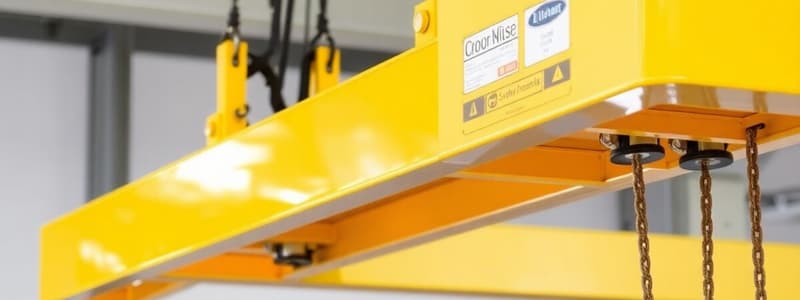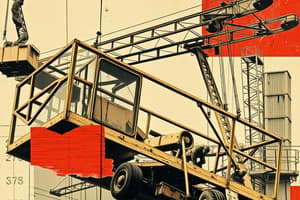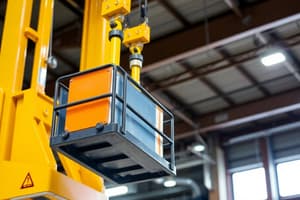Podcast
Questions and Answers
What is the primary purpose of a report of a thorough examination?
What is the primary purpose of a report of a thorough examination?
- To serve as a legal document for equipment usage
- To offer recommendations for improving safety procedures
- To provide details of the defects found in the equipment (correct)
- To declare the compliance of lifting equipment with EU standards
What does the term 'Minimum Breaking Load' refer to?
What does the term 'Minimum Breaking Load' refer to?
- The load limit set by manufacturers for safety purposes
- The average load at which equipment fails
- The load below which equipment will not fracture or distort significantly (correct)
- The maximum load an item of equipment can handle without failing
Which document is NOT typically categorized as a legal document for equipment usage?
Which document is NOT typically categorized as a legal document for equipment usage?
- Manufacturers Certificate
- Test report (correct)
- EC Declaration of Conformity
- Report of Thorough Inspection
What distinguishes multipurpose equipment from other types?
What distinguishes multipurpose equipment from other types?
What does the verification process for lifting equipment ensure?
What does the verification process for lifting equipment ensure?
What is the role of the 'Operative' in lifting operations?
What is the role of the 'Operative' in lifting operations?
What does 'Rated Capacity' represent in lifting appliances?
What does 'Rated Capacity' represent in lifting appliances?
How should a report of thorough examination be treated according to best practices?
How should a report of thorough examination be treated according to best practices?
What is a 'Proof or Test Load' used for?
What is a 'Proof or Test Load' used for?
Which of the following is NOT a method of verification for lifting equipment?
Which of the following is NOT a method of verification for lifting equipment?
Single purpose equipment is characterized by which of the following?
Single purpose equipment is characterized by which of the following?
What was the previous informal term used for certificates related to older lifting equipment?
What was the previous informal term used for certificates related to older lifting equipment?
Which statement is TRUE about the manufacturers certificate?
Which statement is TRUE about the manufacturers certificate?
What is the purpose of a 'Report of Test'?
What is the purpose of a 'Report of Test'?
What is included in a report of a thorough examination if tests have been carried out?
What is included in a report of a thorough examination if tests have been carried out?
What differentiates 'single purpose' from 'multipurpose' equipment?
What differentiates 'single purpose' from 'multipurpose' equipment?
What should a user declare when ordering equipment that may require a reduced SWL?
What should a user declare when ordering equipment that may require a reduced SWL?
In what scenario is it necessary to reduce the working load limit?
In what scenario is it necessary to reduce the working load limit?
If a user does not declare specific conditions when ordering equipment, what assumption will be made by the manufacturer or supplier?
If a user does not declare specific conditions when ordering equipment, what assumption will be made by the manufacturer or supplier?
What is the user's responsibility if the equipment is already in service and certain information has not been declared?
What is the user's responsibility if the equipment is already in service and certain information has not been declared?
Which of the following is NOT considered a hazardous condition that may necessitate a reduced SWL?
Which of the following is NOT considered a hazardous condition that may necessitate a reduced SWL?
What should be done when equipment is fixed permanently for specific installations regarding SWL?
What should be done when equipment is fixed permanently for specific installations regarding SWL?
When providing written instructions for portable equipment, what should the user include?
When providing written instructions for portable equipment, what should the user include?
What is a key consideration for users when using equipment in hazardous duties?
What is a key consideration for users when using equipment in hazardous duties?
What is the formula for calculating net result (risk)?
What is the formula for calculating net result (risk)?
What should employers do to ensure the safety of employees in dangerous work environments?
What should employers do to ensure the safety of employees in dangerous work environments?
In a workplace with hazardous duties, what is recommended for the equipment used?
In a workplace with hazardous duties, what is recommended for the equipment used?
What can significantly contribute to accidents or ill-health in the workplace?
What can significantly contribute to accidents or ill-health in the workplace?
What type of duty do employers have regarding employee safety?
What type of duty do employers have regarding employee safety?
Why is risk assessment important in the workplace?
Why is risk assessment important in the workplace?
What does the term 'reduced working load' imply in the context of workplace equipment?
What does the term 'reduced working load' imply in the context of workplace equipment?
What is one of the factors that is considered in the risk assessment process?
What is one of the factors that is considered in the risk assessment process?
What is produced when metals are damaged?
What is produced when metals are damaged?
What is the primary concern when pure iron is used for lifting equipment?
What is the primary concern when pure iron is used for lifting equipment?
Which metal is most commonly referred to as low carbon steel?
Which metal is most commonly referred to as low carbon steel?
What is an alloy primarily composed of?
What is an alloy primarily composed of?
How is steel produced from iron from the blast furnace?
How is steel produced from iron from the blast furnace?
What elements are commonly blended with iron to form ferrous alloys?
What elements are commonly blended with iron to form ferrous alloys?
What element reacts with carbon in molten iron to produce gases during steel production?
What element reacts with carbon in molten iron to produce gases during steel production?
What characteristic of pure iron makes it unsuitable for lifting equipment applications?
What characteristic of pure iron makes it unsuitable for lifting equipment applications?
What is the primary purpose of a Job Safety Analysis?
What is the primary purpose of a Job Safety Analysis?
In the second step of the risk management approach, what is the focus?
In the second step of the risk management approach, what is the focus?
Which step involves assessing the significance of risks and determining necessary precautions?
Which step involves assessing the significance of risks and determining necessary precautions?
What must be documented in the fourth step of the risk management process?
What must be documented in the fourth step of the risk management process?
Why is it important to regularly review workplace conditions?
Why is it important to regularly review workplace conditions?
What might contribute to the emergence of new hazards in the workplace?
What might contribute to the emergence of new hazards in the workplace?
When identifying hazards, which aspect is emphasized as important?
When identifying hazards, which aspect is emphasized as important?
What is a recent example of a new hazard mentioned in the risk management context?
What is a recent example of a new hazard mentioned in the risk management context?
What must be retained as part of the lifting equipment records according to the guidelines?
What must be retained as part of the lifting equipment records according to the guidelines?
Which of the following best describes the concept of verification in the context of lifting equipment?
Which of the following best describes the concept of verification in the context of lifting equipment?
When does a report of a thorough examination include details of tests?
When does a report of a thorough examination include details of tests?
What type of document is a manufacturers certificate categorized as?
What type of document is a manufacturers certificate categorized as?
What is the first priority for controlling health risks?
What is the first priority for controlling health risks?
Which of the following statements about test reports is accurate?
Which of the following statements about test reports is accurate?
Which option is not part of the hierarchy of control measures?
Which option is not part of the hierarchy of control measures?
What is one consequence of not retaining a report of a thorough examination?
What is one consequence of not retaining a report of a thorough examination?
What is necessary to ensure that safe systems are effective?
What is necessary to ensure that safe systems are effective?
What should be prioritized if elimination of risk is not possible?
What should be prioritized if elimination of risk is not possible?
Which of the following is considered an element of verification for lifting equipment?
Which of the following is considered an element of verification for lifting equipment?
Which new document category is required for equipment marketed in European or British markets?
Which new document category is required for equipment marketed in European or British markets?
Which control measure involves physical separation from the hazard?
Which control measure involves physical separation from the hazard?
What should ensure compliance with control measures in place?
What should ensure compliance with control measures in place?
Why is it necessary to provide suitable information and training to personnel?
Why is it necessary to provide suitable information and training to personnel?
What is a key reason for monitoring and reviewing safety systems?
What is a key reason for monitoring and reviewing safety systems?
What is the primary focus during the first step of a Job Safety Analysis?
What is the primary focus during the first step of a Job Safety Analysis?
In the second step of a Job Safety Analysis, which of the following is determined?
In the second step of a Job Safety Analysis, which of the following is determined?
What should be done with the significant findings from a risk assessment according to step four?
What should be done with the significant findings from a risk assessment according to step four?
Which step of the Job Safety Analysis process emphasizes the importance of ongoing vigilance about hazards?
Which step of the Job Safety Analysis process emphasizes the importance of ongoing vigilance about hazards?
What does the evaluation of risks in step three primarily involve?
What does the evaluation of risks in step three primarily involve?
Why is it critical to regularly review findings from a Job Safety Analysis?
Why is it critical to regularly review findings from a Job Safety Analysis?
Which of the following best describes the purpose of the Job Safety Analysis?
Which of the following best describes the purpose of the Job Safety Analysis?
Which of the following is NOT a component of the five-step risk management process?
Which of the following is NOT a component of the five-step risk management process?
What is the primary metal used in lifting equipment due to its light weight and corrosion resistance?
What is the primary metal used in lifting equipment due to its light weight and corrosion resistance?
Which factor is most likely to necessitate a reduction in the working load limit for equipment?
Which factor is most likely to necessitate a reduction in the working load limit for equipment?
Which characteristic makes Monel Metal suitable for use in acidic conditions?
Which characteristic makes Monel Metal suitable for use in acidic conditions?
Which material has a minimum of 12% chromium added for improved corrosion resistance and is commonly used in lifting applications?
Which material has a minimum of 12% chromium added for improved corrosion resistance and is commonly used in lifting applications?
What responsibility does the user have if they have not declared specific conditions to the manufacturer?
What responsibility does the user have if they have not declared specific conditions to the manufacturer?
What is the significance of the grade in lifting chains?
What is the significance of the grade in lifting chains?
In what scenario should the burden of responsibility shift from the manufacturer to the user?
In what scenario should the burden of responsibility shift from the manufacturer to the user?
What characteristic does bronze possess due to the presence of tin in its alloy?
What characteristic does bronze possess due to the presence of tin in its alloy?
What must be included in written instructions for portable equipment?
What must be included in written instructions for portable equipment?
What is the consequence of not declaring a requirement for reduced SWL at the time of ordering?
What is the consequence of not declaring a requirement for reduced SWL at the time of ordering?
What happens to the breaking strength of a chain when its diameter increases?
What happens to the breaking strength of a chain when its diameter increases?
Which condition is an example of hazardous duties that may necessitate a lower SWL?
Which condition is an example of hazardous duties that may necessitate a lower SWL?
Which material is considered tough and ductile while also providing good resistance to corrosion?
Which material is considered tough and ductile while also providing good resistance to corrosion?
Why is welding Monel Metal considered expensive?
Why is welding Monel Metal considered expensive?
What should be done for equipment fixed permanently in position concerning its SWL?
What should be done for equipment fixed permanently in position concerning its SWL?
Which of the following best describes the user's obligations for lifting equipment in hazardous conditions?
Which of the following best describes the user's obligations for lifting equipment in hazardous conditions?
What does the acronym SWL stand for in lifting equipment terminology?
What does the acronym SWL stand for in lifting equipment terminology?
What is the main difference between Working Load Limit (WLL) and Safe Working Load (SWL)?
What is the main difference between Working Load Limit (WLL) and Safe Working Load (SWL)?
Which of the following statements is true regarding the use of terminology in lifting equipment?
Which of the following statements is true regarding the use of terminology in lifting equipment?
In which situation would a proof load test not typically be included?
In which situation would a proof load test not typically be included?
Which statement best defines the term ‘rated capacity’?
Which statement best defines the term ‘rated capacity’?
What is typically marked on lifting equipment to indicate its safe working limits?
What is typically marked on lifting equipment to indicate its safe working limits?
Why is it important to understand the difference between SWL and WLL?
Why is it important to understand the difference between SWL and WLL?
Which of the following best describes an error in understanding SWL and WLL?
Which of the following best describes an error in understanding SWL and WLL?
Flashcards
Minimum Breaking Load
Minimum Breaking Load
The lowest load (mass or force) that an item of equipment can withstand before failure (fracture or distortion).
Multipurpose Equipment
Multipurpose Equipment
Equipment designed to a standard for lifting various loads up to its marked safe working load (SWL).
Operative
Operative
A trained person who uses lifting equipment.
Rated Capacity
Rated Capacity
Signup and view all the flashcards
Proof/Test Load
Proof/Test Load
Signup and view all the flashcards
Single-Purpose Equipment
Single-Purpose Equipment
Signup and view all the flashcards
Report of Test
Report of Test
Signup and view all the flashcards
Working Load Limit
Working Load Limit
Signup and view all the flashcards
Test Report Legal Status
Test Report Legal Status
Signup and view all the flashcards
EC Declaration of Conformity
EC Declaration of Conformity
Signup and view all the flashcards
Manufacturer's Certificate
Manufacturer's Certificate
Signup and view all the flashcards
Verification (lifting equipment)
Verification (lifting equipment)
Signup and view all the flashcards
Report of Thorough Examination
Report of Thorough Examination
Signup and view all the flashcards
Competent Person
Competent Person
Signup and view all the flashcards
Lifting Equipment Verification
Lifting Equipment Verification
Signup and view all the flashcards
Lifting Equipment Records
Lifting Equipment Records
Signup and view all the flashcards
Reduced SWL
Reduced SWL
Signup and view all the flashcards
Hazardous Duties
Hazardous Duties
Signup and view all the flashcards
Risk Assessment
Risk Assessment
Signup and view all the flashcards
SWL Declaration
SWL Declaration
Signup and view all the flashcards
User Responsibility
User Responsibility
Signup and view all the flashcards
Fixed SWL
Fixed SWL
Signup and view all the flashcards
Portable SWL
Portable SWL
Signup and view all the flashcards
Equipment Usage Restrictions
Equipment Usage Restrictions
Signup and view all the flashcards
Risk
Risk
Signup and view all the flashcards
What is the formula to calculate risk?
What is the formula to calculate risk?
Signup and view all the flashcards
What is a 'Reduced Working Load' (RWL)?
What is a 'Reduced Working Load' (RWL)?
Signup and view all the flashcards
When should RWL be used?
When should RWL be used?
Signup and view all the flashcards
SWL (Safe Working Load)
SWL (Safe Working Load)
Signup and view all the flashcards
WLL (Working Load Limit)
WLL (Working Load Limit)
Signup and view all the flashcards
Why is knowing the RWL important?
Why is knowing the RWL important?
Signup and view all the flashcards
What are metals made from?
What are metals made from?
Signup and view all the flashcards
What are alloys?
What are alloys?
Signup and view all the flashcards
Ferrous Metals
Ferrous Metals
Signup and view all the flashcards
Non-Ferrous Metals
Non-Ferrous Metals
Signup and view all the flashcards
Low Carbon Steel
Low Carbon Steel
Signup and view all the flashcards
Why is pure iron not ideal for lifting equipment?
Why is pure iron not ideal for lifting equipment?
Signup and view all the flashcards
How is steel made?
How is steel made?
Signup and view all the flashcards
What determines the type of steel?
What determines the type of steel?
Signup and view all the flashcards
Job Safety Analysis
Job Safety Analysis
Signup and view all the flashcards
5-Step Risk Management
5-Step Risk Management
Signup and view all the flashcards
Identify Hazards
Identify Hazards
Signup and view all the flashcards
Who Might Be Harmed?
Who Might Be Harmed?
Signup and view all the flashcards
Evaluate Risks & Precautions
Evaluate Risks & Precautions
Signup and view all the flashcards
Record Findings & Implement
Record Findings & Implement
Signup and view all the flashcards
Review Findings Regularly
Review Findings Regularly
Signup and view all the flashcards
Constant Vigilance
Constant Vigilance
Signup and view all the flashcards
Test Reports
Test Reports
Signup and view all the flashcards
Report of Thorough Examination Purpose
Report of Thorough Examination Purpose
Signup and view all the flashcards
What is SWL?
What is SWL?
Signup and view all the flashcards
What is WLL?
What is WLL?
Signup and view all the flashcards
What is the difference between SWL and WLL?
What is the difference between SWL and WLL?
Signup and view all the flashcards
What is a Thorough Examination?
What is a Thorough Examination?
Signup and view all the flashcards
What is a Proof Load Test?
What is a Proof Load Test?
Signup and view all the flashcards
Is a proof load test part of a thorough examination?
Is a proof load test part of a thorough examination?
Signup and view all the flashcards
What is a 'Report of Thorough Examination'?
What is a 'Report of Thorough Examination'?
Signup and view all the flashcards
What is a 'Competent Person'?
What is a 'Competent Person'?
Signup and view all the flashcards
SWL Reduction
SWL Reduction
Signup and view all the flashcards
Study Notes
Industry Relevant Definitions
- Minimum Breaking (or Failure) Load: The specified load (mass or force) below which the equipment does not fail (fracture or distort).
- Multipurpose Equipment: Designed to lift various loads, following a standard specification, for general use, not a specific application.
- Operative: A trained person who operates lifting equipment.
- Rated Capacity: The maximum gross load a lifting appliance can safely lift in a specific configuration.
- Proof or Test Load: A load applied by a competent person to test the equipment. Included on reports of thorough examination and test certificates.
- Single Purpose Equipment: Designed for lifting a specific load or purpose in a specific manner or environment.
- Report of Test: A document issued by a competent person detailing test specifics. Not a legal document for use alone, but can support documents like EC declarations or manufacturer certificates.
Verification
- Verification: Procedures used by a manufacturer or competent person to confirm lifting equipment meets specifications, legal requirements, and standards. Includes proof load tests, sample break tests, non-destructive tests, and thorough examination.
- Verification - New Equipment: Verification methods for new equipment depend on the relevant standard. Some types of equipment are not suitable for proof load testing.
Report of a Thorough Examination
- Report of a Thorough Examination: A report issued by a competent person detailing findings and results of thorough inspection. It will state defects found or whether the item is fit for continued use.
- Key Note 1: The thorough examination report should be part of the lifting equipment records.
- Key Note 2: The test report might be included as an appendix
Safe Working Load (SWL)
- Safe (Specific application) Working Load (SWL): The maximum load (mass) a competent person has assessed an item of lifting equipment to safely raise, lower, or suspend under given conditions. This value is usually marked on the equipment and recorded.
- Working Load Limit (WLL): The maximum load (mass) an item of lifting equipment is designed to raise, lower, or suspend. Often, the SWL value is equal to the WLL.
Controlling Risks
- Reasons for Risk Assessment: 1) Human harm (injury/illness), 2) Legal consequences (duty of care, inadequate assessment), 3) Economic effects (substantial financial costs).
- Hazard: Something that has the potential to cause harm.
- Danger: A liability or exposure to harm; something that may cause peril.
Probability and Severity
- Probability: The likelihood that harm from a hazard occurs.
- Severity: The potential harm's consequence if a hazard does occur.
- Risk: Combined likelihood and severity (Probability x Severity).
Risk Assessment Steps
- Step 1: Identify Hazards: Finding all hazards in the workplace.
- Step 2: Decide Who Might Be Harmed and How: Determining who might be harmed and how.
- Step 3: Evaluate Risks and Decide on Precautions: Assessing risk significance and necessary precautions
- Step 4: Record Findings and Implement Precautions: Document results and implement precautions.
- Step 5: Review Findings: Regularly review and update procedures due to changes in equipment, processes, or workplace conditions.
Identifying People at Risk
- Considering people at risk includes those carrying out particular activities, and those who might be affected by those activities (nearby workers, cleaners, security, visitors, etc.).
Material Properties (Steel Grades)
- Strength: Resistance to deformation or being squeezed.
- Ductility: Ability to be deformed without fracture under tensile stress.
- Malleability: Ability to be deformed under compressive stress.
- Brittleness: Tendency to fracture easily.
- Elasticity: Ability to return to original shape after stress removal.
- Toughness: Ability to absorb energy and deform before fracturing.
- Hardness: Resistance to permanent shape change under pressure.
- Corrosion: Oxidisation reactions affecting metals.
- Steel Grades: Different grades of steel (e.g., Grade 4, Grade 6, Grade 8, Grade 10, Grade 12) have different breaking strengths.
Materials Used in Lifting Equipment
- Lifting equipment components can be made from metals, polymers, and natural products.
- Specific metals can be alloys (e.g., copper/zinc in brass or copper/tin in bronze) or specific grades of iron and steel. Steel grades are typically reported with their breaking strength.
Studying That Suits You
Use AI to generate personalized quizzes and flashcards to suit your learning preferences.




